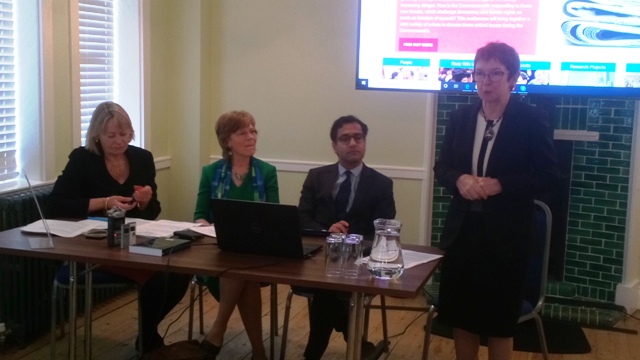 (L-r) Sue Onslow(ICWS), Julia Bicknell (World Watch Monitor), Rehman Chisthi and Professor Wendy Thomson, Vice-Chancellor (University of London), standing.
(L-r) Sue Onslow(ICWS), Julia Bicknell (World Watch Monitor), Rehman Chisthi and Professor Wendy Thomson, Vice-Chancellor (University of London), standing.
Academics, journalists and Commonwealth watchers gathered to scrutinise the connected roles of religious and media freedom across the 54-nation organisation at a one-day event on 10 March in London. The conference on ‘Religion, Media and the Commonwealth’ was one of the many Commonwealth-related events organised during Commonwealth Week. The organisers were the Institute of Commonwealth Affairs, the School of Advanced Study, University of London, World Watch Monitor and the Commonwealth Journalists Association (CJA).
One challenge facing Commonwealth journalists was immediately obvious as the key speaker for the first main panel session on Africa – Chief Emeka Ezeze of the Nigerian Guardian – took part via Skype because his visa application to travel to London had been turned down by the UK’s Home Office. Questions about the reasons behind this visa denial managed to spill into the opening of the conference as the UK Prime Minister’s Special Envoy on Freedom of Religion and Belief, Rehman Chishti, found himself questioned after his opening remarks on the Home Office’s decision, despite his Foreign Office background.
Mr Chishti, a Conservative MP, was appointed by Boris Johnson in September 2019 to look at ways to promote religious freedom. This envoy role has been moved from within the wide portfolio of Foreign Office Minister, Lord Ahmad. Rehman Chishti has his own history of human rights advocacy in parliament and, as this panel event’s organisers pointed out, put his own career on the line when he resigned as Vice Chairman of the Conservative party over the issue of asylum for Asia Bibi in 2018. “There are many more Asia Bibis around the world,” he told his audience, pointing out that religious persecution was on the rise and that the media needed the freedom to highlight this. He said that the UK could not be complacent within the Commonwealth family given its position on the World Press Freedom index. He argued the need to empower journalists and to give diplomats the necessary training to make a difference in challenging the infringement of religious beliefs around the world. Mr. Chishti noted that in one survey, more than 80% of the global community identified with one faith or another but this was not reflected in the media which he stated has a crucial role to play in countering the suppression of religious rights and freedom of expression. He said that freedom of expression and religion are the cornerstones of democracy and urged that the strengthening of these rights should be vigorously pursued at the Commonwealth Summit in Rwanda.
Focus on Nigeria
In the first of a series of panel sessions focusing on different parts of the Commonwealth, Chief Emeka Izeze, the Managing Editor and Editor-in-Chief of the Guardian, Nigeria, answered questions on Skype from Lagos following his presentation on challenges to media freedom in Nigeria.
Chief Izeze outlined how, in addition to legislation which encroached on media freedom, many factors including the growth of social media, media self-censorship and the mainstream media often getting too close to politics and power, had helped to dilute the power of the media. He pointed to the news blackout on religious conflicts, the franchising of insurgent groups and the rise of armed banditry. Describing social media as the “weaponisation of news”, he said that it had muddied the waters. “Social media is as important now as the formal media,” he told his audience in London, adding that social media could also become a tool in the process of democratisation.
Hindu activism in India
At a session on Hindu activism in India, a senior journalist, Vishal Arora, analysed the recent upsurge of violence in the country. Demonstrations against a new citizenship law and national registry, which protesters say would discriminate against Muslim citizens, have been taking place in cities throughout India since December. Violence erupted in Delhi on 23 February after, according to some reports, a local leader of the ruling Bharatiya Janata Party (BJP) threatened a crackdown against the protesters. At least 53 people, a majority of whom were Muslims, were killed in riots over four days. The communal attacks are being seen by many as part of the Prime Minister, Narendra Modi’s agenda to transform India into a Hindu state. Arora said there were indications that the violence was stoked by people who had been brought in from outside of the affected areas. Police are accused of failing to intervene while Muslims were attacked. Arora and other analysts think it was a misrepresentation for the disturbances to be described in the media as clashes between Hindus and Muslims since the attacks were said to be instigated largely by Hindu extremists although Hindus were among the victims. Arora said Christians and other minorities were also targeted. He said 2019 was the most violent year for Christians. According to Arora, the governing BJP was seeking to project itself as the most patriotic party and that anyone not pro-BJP was painted as anti-Indian. Much of the mainstream media in India, especially TV channels, is broadly supportive of the BJP. Other outlets and publications are said to be resorting to self-censorship because of the fear of repercussions.
Genesis of the workshop
The day-long event on religion and media freedom on March 10 was designed to continue the discussion of media reportage which had been raised at a conference hosted by the Foreign and Commonwealth Office on Global Media Freedom in July 2019. The Institute of Commonwealth Studies decided to host the discussion during Commonwealth Week to focus on the contemporary challenge to ‘the fourth estate’, with its role of underpinning democratic governance across the multi-faith Commonwealth.
Debbie Ransome is the Web Editor for The Round Table and a member of the CJA executive. Rita Payne is President Emeritus of the CJA and CJA UK President.



